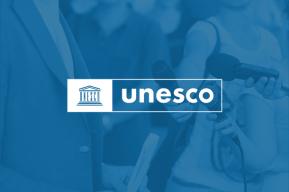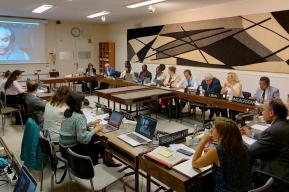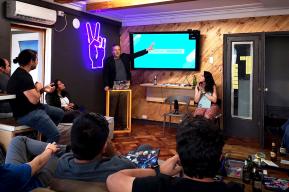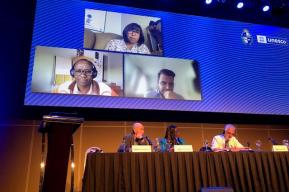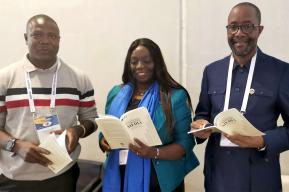Article
New policy brief on media viability launched a World Press Freedom Day

Media viability : what can really be done?
Her speech kicked off a dynamic panel at the UNESCO global conference taking place in Uruguay, chaired by UNESCO regional advisor Rosa Gonzalez.
The Ambassador was speaking as chairperson of the International Programme for the Development of Communication (IPDC), which leads UNESCO’s contribution to the quest for sustainable journalism.
A special allocation of funds by the IPDC Bureau in 2021 helped towards the financing of the new policy brief, which is titled “Finding the funds for journalism to thrive policy options to support media viability”.
The chairperson pointed out in her remarks that “press freedom without economically secure media would be an empty shell”. She noted further that how policy brief underlined that new support for journalism should never be at the expense of editorial independence or media pluralism.
“Today, we can see opportunities to secure our current news media outlets. But our ambition should be higher: to expand the sector and to transform it to be more gender-sensitive, more socially inclusive and more professional,” said the Ambassador.
Other points made by panelists at the launch:
- Ms Danielle Coffey, Executive manager, News Media Alliance, USA - she highlighted prospects for a law to give tax credits to small media in her country.
- Government advertising must be addressed by transparency regulation, and a new tradition of subsidies should introduced, said Mr. Agustín Espada, Quilmes National University, Argentina, author of the report . "Impact of the COVID-19 pandemic on media sustainability in Latin America".
- Canada has availed $20m to support local journalist jobs in the country, said Paul Deegan, , head of News Media Canada.
- Mr Luis Ajenjo, President of Radio Cooperartiva de Chile, was in favour of the policy brief recommendation to set up national task forces on viability, but with a focus on making big tech pay. Subsidies for media should be complemented by regulation of the “tech predators responsible for our situation and threats to democracy"
- It is very hard in divided societies to build consensus around laws to subsidise news media; instead the big tech polluters globally should have to pay for cleaning up the info environment - but will this take generations, said Mr Marcelo Rech, President, National Association of Newspapers, Brazil. He advocated instead for global coordination and a “global bargaining call”.
- Ms Mijal Iastrebner, Sembramedia, Argentina observed that the sustainability crisiis is not just about the money, but also about organisational and corporate leadership and the need to develop new roles in enterprises. She called for media leadership, training and innovative management practices.
The session was also attended by deputy permanent delegate for Dominican Republic, Mr Pablo Medina Jimenez, who is a vice-chair of the IPDC.
To reveal the extent of UNESCO’s work on media viability, a dedicated web page has been created. It provides links to:
- A report “Breaking news” produced by Economist Impact, under UNESCO commission
- A special chapter in the World Trends in Freedom of Expression and Media Development Global Report 2021/2022.
- A handbook in five languages on inspiring practices at the media outlet level


